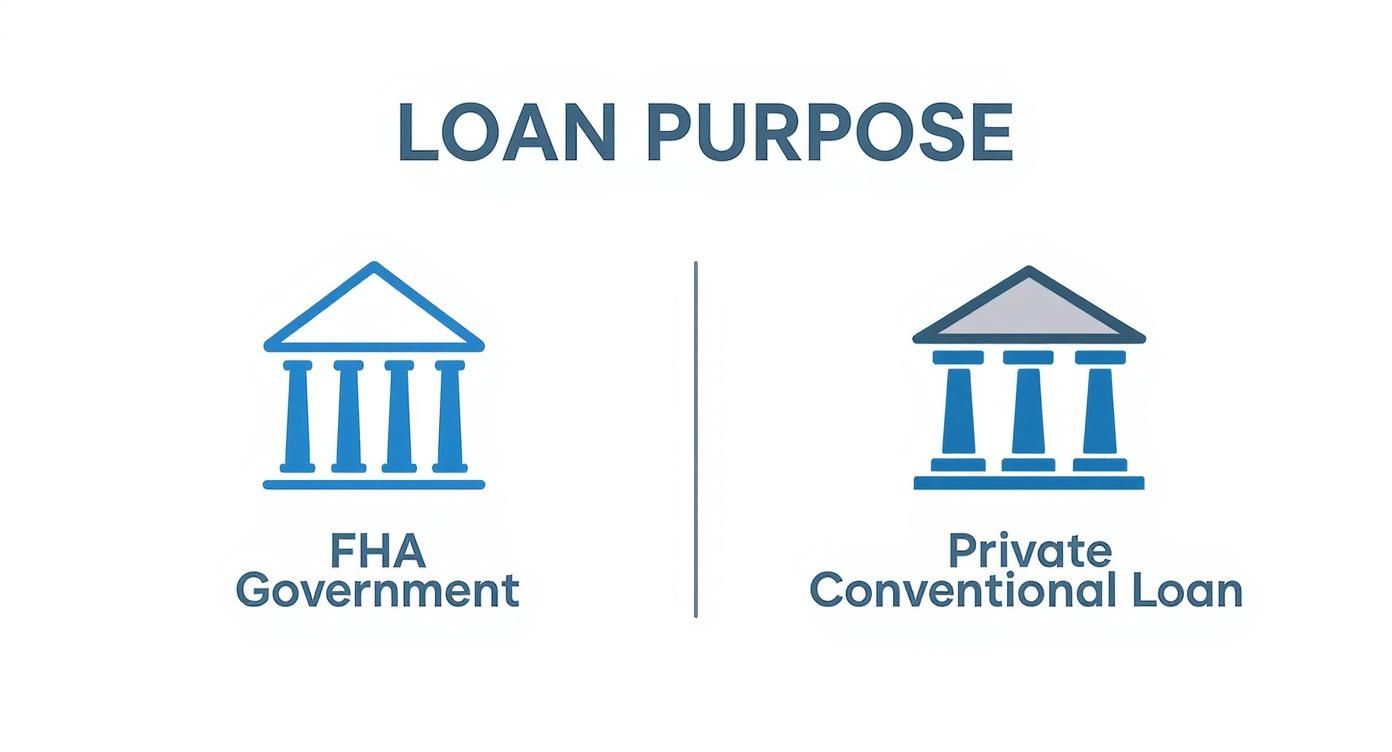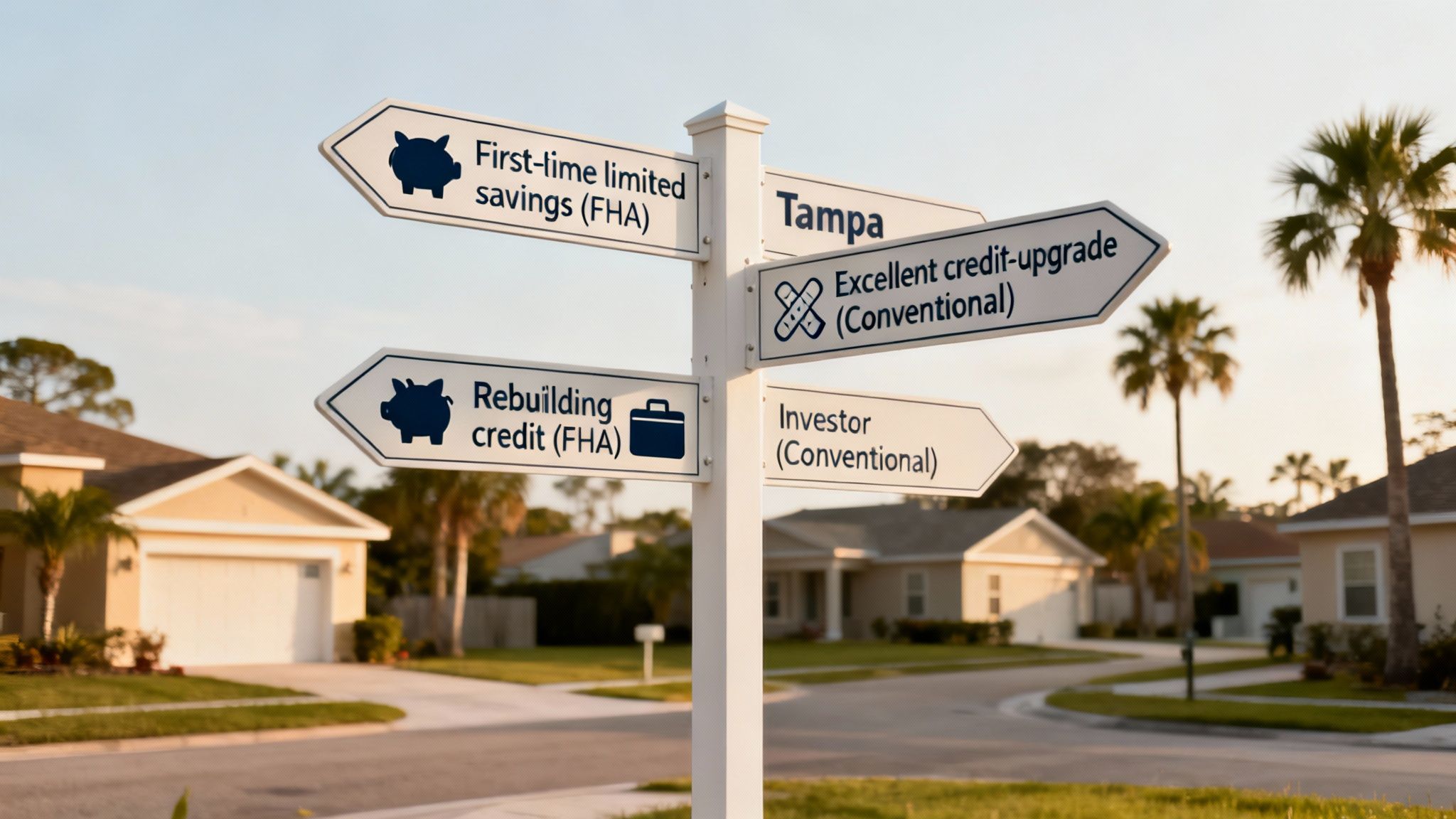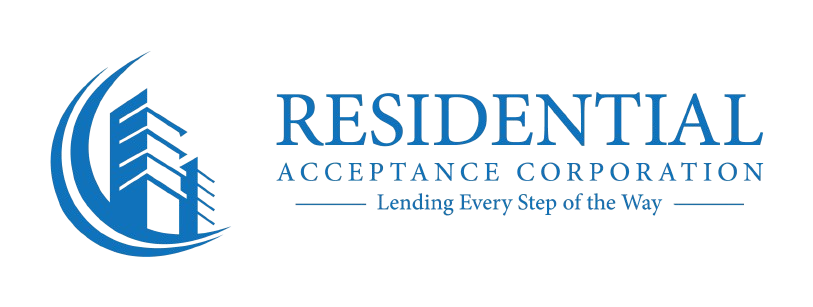Deciding between a conventional loan and an FHA loan really boils down to your personal financial picture. For many Tampa homebuyers, especially those with less-than-perfect credit or smaller savings accounts, an FHA loan is often the most accessible path to homeownership.
But let’s be clear: if you have strong credit and a healthy down payment, a conventional loan will almost always save you more money over the long haul.
FHA vs. Conventional Loans in Tampa: The Quick Answer
When you’re ready to buy a home in Tampa, picking the right mortgage can feel like the biggest decision you'll make. Both FHA and conventional loans can get you the keys to your new home, but they’re really designed for two different types of buyers. Getting a handle on their core differences is the first step toward making a smart financial choice.
An FHA loan, which is backed by the government, is built to help more people get into a home. It offers a lot of flexibility for folks who might not meet the stricter standards of other loan types.
On the other hand, a conventional loan is offered by private lenders, like us here at RAC Mortgage. These loans typically reward borrowers who have solid financial histories with better terms and lower long-term costs.

Key Eligibility Differences
The biggest gap between these two loans comes down to credit scores and down payments. The FHA is much more forgiving. You can get an FHA loan with a credit score as low as 580 and only put 3.5% down. If your score is between 500 and 579, you can still qualify, but you'll need a 10% down payment. This flexibility opens doors for Tampa buyers who've hit a few credit bumps in the past.
Conventional loans are a different story. Lenders generally want to see a credit score of 620 or higher. And while some programs allow for down payments as low as 3%, the best terms—and the ability to avoid private mortgage insurance (PMI) from day one—are reserved for those who can put down at least 20%. You can get more details on how these loan requirements compare on Experian.com.
The fundamental choice is this: an FHA loan helps you buy a home sooner by having less stringent requirements, while a conventional loan helps you save more money in the long run if you qualify.
To make things even clearer, let's break down the main differences side-by-side.
FHA vs. Conventional Loan At a Glance
This table gives you a quick snapshot of how these two popular loan types stack up against each other.
| Feature | FHA Loan | Conventional Loan |
|---|---|---|
| Minimum Credit Score | 580 for lowest down payment | Typically 620+ |
| Minimum Down Payment | 3.5% | As low as 3% for some programs |
| Mortgage Insurance | Required for the life of the loan | Avoidable with 20% down |
| Best For | Lower credit scores, small savings | Strong credit, larger down payment |
Looking at a simple chart helps, but nothing beats talking it through. Navigating these options with a local expert who understands the Tampa market, like our team at RAC Mortgage, can provide the clarity you need to pick the loan that truly aligns with your financial goals.
FHA vs. Conventional: What's the Real Difference?
Before you even start looking at down payments or interest rates, you need to understand the 'why' behind FHA and conventional loans. They aren't just two different products; they were built for completely different types of homebuyers, especially here in the competitive Tampa market. Getting this fundamental difference down will make your decision a whole lot clearer.
An FHA loan is a mortgage insured by a government agency, the Federal Housing Administration. Its entire mission is to open the door to homeownership for people who might otherwise get shut out of the market. This is why you'll see more forgiving rules around credit scores and how much money you need to put down.
That government insurance is basically a safety net for lenders like RAC Mortgage. It gives us the confidence to approve loans for buyers who, on paper, might look like a bigger risk.
The Government-Backed Path to Your First Home
Think of an FHA loan as a purpose-built on-ramp to owning a home. It’s specifically designed to help:
- First-time homebuyers in Tampa who haven't had years to build up a huge savings account.
- Borrowers who've hit a few financial bumps in the road and are now rebuilding their credit.
- People who are ready to buy now but only have a small down payment.
The whole FHA program is structured to knock down the biggest financial hurdles that keep people stuck in the rent cycle.
The entire philosophy behind an FHA loan is access. The goal is to get good, qualified people into homes by taking some of the risk off the lender’s shoulders.
The Private Market Alternative
On the other side of the coin, a conventional loan has no government guarantee. This is a straight-up mortgage from a private lender, like us at RAC Mortgage, that has to play by the rules set by Fannie Mae and Freddie Mac. Since there’s no government backstop, the lender is on the hook for 100% of the risk.
Naturally, when a lender takes on all the risk, they're going to be a lot pickier. That’s why conventional loans demand more from borrowers—higher credit scores, a solid financial history, and often, a bigger chunk of cash for the down payment.
For Tampa buyers who can clear those higher bars, a conventional loan is almost always the cheaper option over the long haul. The real question is whether your financial picture is a better fit for a risk-averse private lender or a mission-driven government program.
Digging Into the True Cost of Mortgage Insurance
When you're weighing an FHA loan against a conventional one, the biggest long-term cost difference boils down to one thing: mortgage insurance. This isn't just some minor fee. It can easily add tens of thousands of dollars to your loan over its lifetime, making it a critical detail for any Tampa homebuyer to get right.
FHA and conventional loans handle this insurance completely differently, and understanding that structure is key. It directly impacts both your monthly payment and how much you'll ultimately pay for your home.
FHA's Mortgage Insurance Premium (MIP)
FHA loans actually hit you with a two-part mortgage insurance premium. First up is the Upfront Mortgage Insurance Premium (UFMIP), which is a hefty 1.75% of your total loan amount. Most people don't pay this out of pocket; they just roll it into the loan balance, but you're still paying interest on it for years.
Then, you have the monthly Mortgage Insurance Premium (MIP). Here's the kicker: for most borrowers putting down the minimum 3.5%, that monthly MIP payment is there for the entire life of the loan. It never goes away. This is a massive financial drawback compared to the conventional alternative.
The fact that FHA MIP sticks around forever is a huge deal. Even after you've built up a ton of equity in your home, you're still stuck paying that extra insurance fee every single month. It really inflates the total cost of your mortgage over the long haul.
This fundamental difference stems from who is backing the loan.

As you can see, FHA loans are government-insured, which is why they have such strict (and permanent) insurance rules. Conventional loans, backed by private companies, offer a way out.
The Conventional Loan Advantage: Private Mortgage Insurance (PMI)
Conventional loans use a totally different system called Private Mortgage Insurance (PMI). Unlike FHA, you only need PMI if your down payment is less than 20%. This is where the potential for huge savings comes into play.
Once you hit that 20% equity mark in your home—either by paying down your principal or through your home's value going up—you can ask your lender to cancel your PMI. Even better, lenders are legally required to automatically drop PMI once your loan balance hits 78% of the original purchase price. You can get a full breakdown by checking out what private mortgage insurance is with our detailed guide.
Mortgage Insurance Cost Comparison FHA MIP vs Conventional PMI
Let's put some real numbers on this. The table below breaks down the mortgage insurance costs for a typical Tampa home, showing just how different the financial impact is between FHA and conventional loans.
| Cost Factor | FHA Loan (MIP) | Conventional Loan (PMI) |
|---|---|---|
| Upfront Cost | Yes, 1.75% of the loan amount rolled into the balance. | No, there is no upfront premium. |
| Monthly Cost | Yes, a fixed percentage paid every month. | Yes, but only if you put down less than 20%. |
| Duration | For the life of the loan (in most cases). | Temporary. Can be canceled at 20% equity. |
| Long-Term Savings | None. The cost is permanent. | Significant. Eliminating PMI lowers your monthly payment. |
The takeaway is clear. While FHA gets you in the door with a low down payment, the permanent MIP can be a financial anchor. Conventional PMI, on the other hand, offers a clear escape hatch, giving you a path to lower your housing costs in the future.
The experts at RAC Mortgage can run these numbers based on your specific financial picture. We'll show you exactly how much you could save over the years by choosing a loan that lets you finally say goodbye to mortgage insurance.
Breaking Down Borrower Eligibility Requirements
So, you're trying to figure out if a conventional or FHA loan is the right move. The answer usually comes down to the nitty-gritty of eligibility requirements. Lenders will size you up based on three key things: your credit score, how much you've saved for a down payment, and your debt-to-income ratio. These aren't just checkboxes; they determine whether you get approved and what kind of terms you'll be offered for your Tampa home loan.
FHA and conventional loans look at these numbers through different lenses. One program is built for accessibility, making homeownership possible for more people. The other is designed to reward borrowers who have a stronger financial profile. Once you see where you stand, the choice often becomes a whole lot clearer.
Credit Score: The First Major Hurdle
Let's be honest, your credit score is the first thing a lender looks at. It's their quick snapshot of how you handle your finances, and it carries a ton of weight. This is where you see the biggest initial difference between an FHA and a conventional loan.
FHA loans are famous for being more flexible. You can often get in the door with a credit score as low as 580. For a lot of buyers who are still building their credit or have hit a few financial bumps in the road, this is a game-changer. It opens up the possibility of owning a home in the Tampa area to a much wider group of people.
Conventional loans, on the other hand, expect a bit more. The absolute minimum is usually around 620, but to get the really good interest rates, lenders want to see scores of 740 or higher. If you’ve worked hard to build great credit, a conventional loan will almost always save you more money in the long run.
Here's the bottom line for Tampa buyers: an FHA loan can get your foot in the door even with a lower credit score, but a conventional loan rewards excellent credit with significantly lower costs over time. Your credit history really dictates which path makes more financial sense.
Down Payment and Financial Reserves
Next up is the down payment—the cash you bring to the table. This is another spot where FHA and conventional loans go their separate ways.
The FHA program's biggest claim to fame is its low down payment requirement. You can get into a home with as little as 3.5% down, as long as your credit score is 580 or better. This is huge for first-time homebuyers in Tampa who just haven't had the time to save up a massive nest egg.
Conventional loans have low down payment options too, with some programs letting you put down just 3%. The catch is that the best terms are reserved for those who can put down more. For a full breakdown, check out our guide on the conventional loan down payment requirement. If you can manage to put down 20% or more, you get to skip Private Mortgage Insurance (PMI) entirely, which is a major monthly saving.
Your Debt-to-Income (DTI) Ratio
Finally, lenders will look at your Debt-to-Income (DTI) ratio. It’s a simple calculation: they add up all your monthly debt payments (car loan, credit cards, student loans) and divide it by your gross monthly income. This number tells them if you can comfortably afford to add a mortgage payment to your budget.
Once again, FHA guidelines are more forgiving. In certain situations, you might get approved with a DTI ratio as high as 50%.
Conventional loans are stricter. Lenders typically want to see a DTI of 43% or lower. There's sometimes wiggle room if you have other strengths, like a high credit score or a lot of cash in savings. The team here at RAC Mortgage can dig into your specific DTI and help you figure out which loan program is the best fit for your situation.
Matching the Right Loan to Your Tampa Homebuying Scenario

The whole "conventional loan or FHA which is better" debate gets a lot simpler when you ground it in real-world situations. Let's walk through a few common Tampa homebuyer profiles to see which loan usually fits best. You might just see your own story in one of these scenarios.
Everyone's path to owning a home is different, but these examples connect the dots between a borrower's situation and a loan's core features.
The First-Time Buyer with Limited Savings
Picture a young professional working in Tampa. They've got a steady job, but they just haven't had enough time to stash away a huge pile of cash. Their credit score is a decent 640, but they can only realistically scrape together about 4% for a down payment.
For this person, an FHA loan is the clear winner. It's practically built for this exact situation, with its 3.5% minimum down payment and more forgiving credit standards. A conventional loan might be possible, but it would saddle them with costly PMI and likely a higher interest rate.
The Established Homeowner Upgrading
Now, let's think about a couple who bought their starter home a decade ago. They've built up a good chunk of equity and now have excellent credit (780+). With a low debt-to-income ratio, they're planning to use the profit from their home sale to put 25% down on a bigger place in South Tampa.
In this case, a conventional loan is the obvious choice. By putting down more than 20%, they completely sidestep private mortgage insurance, which means their monthly payment will be as low as it can get. That killer credit score will also unlock the absolute best interest rates on the market.
The best loan isn't about which one is "better" on paper. It's about which financial tool makes the most sense for your credit, your savings, and where you are in life right now.
The Buyer Rebuilding Their Credit
Here's another common story: a Tampa buyer who hit a rough patch financially a few years back is now getting back on their feet. Their credit score is still on the mend at 595, but they have a stable income and have managed to save a 5% down payment.
This is another textbook scenario for an FHA loan. With a credit score under 620, a conventional loan is simply off the table. The FHA program acts as a vital bridge to homeownership, giving them a chance to buy now while they continue to improve their financial profile. Down the road, they can always refinance into a conventional loan.
The Real Estate Investor
Finally, imagine someone who wants to buy a duplex in Seminole Heights. The plan is to live in one unit and rent out the other to help cover the mortgage.
When it comes to investment properties, a conventional loan is the only option. FHA loans are strictly for primary residences, period. This is a black-and-white rule that makes the decision for the borrower instantly. While this is a clear-cut case, it’s a good reminder that other loan comparisons, like a USDA loan vs. conventional for rural properties, have their own unique eligibility rules.
These scenarios can help point you in the right direction, but your situation has its own nuances. The team at RAC Mortgage can dig into your specific profile to map out the smartest path for your Tampa home purchase.
Making the Right Call for Your Tampa Mortgage with RAC
Picking the right mortgage is a huge part of buying a home. This guide gives you the basics, but let's be honest—the Tampa housing market is its own animal. A general guide can't possibly cover the local quirks and competition you'll face here.
A quick chat with a local expert can uncover opportunities you didn't know existed, or help you sidestep challenges specific to your finances and the neighborhood you're eyeing. Instead of wondering if an FHA or conventional loan is the better fit, you can get a straight answer that actually applies to you.
Your Local Tampa Mortgage Partner
Here at RAC Mortgage, our team doesn't just work in Tampa—we live here. We know the ins and outs of the local real estate scene because we're part of it. Our whole focus is helping Tampa buyers sort through their options to lock in the best financing for their dream home.
Choosing a loan isn't just about crunching numbers. It’s about matching a financial tool to where you want to be in the long run. The right advice ensures you're not just buying a house, but making a smart investment in your future.
Here’s how we can help you figure it all out at RAC Mortgage:
- We'll dig into your full financial picture to see which loan program truly gives you the upper hand.
- We'll compare the long-term costs of FHA mortgage insurance versus conventional PMI, based on your actual loan amount.
- We'll help you find local down payment assistance programs right here in the Tampa area that you might qualify for.
Take the Next Step with Confidence
Don't gamble on the biggest financial move you'll probably ever make. Get in touch with the local pros at RAC Mortgage today for a no-strings-attached consultation. Let us help you map out a clear path to owning a home in Tampa. Our job is to make things simple and support you, so you feel confident from the moment you apply to the day you get the keys.
FHA vs. Conventional: Your Top Questions Answered
When you're weighing an FHA loan against a conventional one, the big-picture differences are one thing. But as Tampa homebuyers get closer to a decision, the specific "what if" scenarios start to pop up.
Here are the answers to the questions we hear most often at RAC Mortgage.
Can I Refinance from an FHA Loan to a Conventional Loan?
Absolutely. In fact, this is a fantastic financial strategy that many FHA borrowers plan for right from the start.
Once you’ve built up at least 20% equity in your home and your credit score is in a better place, refinancing into a conventional loan is a savvy move. Making that switch lets you ditch the FHA Mortgage Insurance Premium (MIP) for good. That one change can shave a significant amount off your monthly payment and often lands you a better interest rate, too.
Is One Loan Type Just Flat-Out Cheaper?
Not a chance. The "cheaper" loan isn't a fixed target—it completely depends on your financial snapshot at the moment you apply.
For a Tampa homebuyer with a strong credit history and a solid down payment, a conventional loan will almost always be the winner in terms of overall cost. No question.
But for someone with a lower credit score, an FHA loan can sometimes come with a more competitive interest rate, making it the more affordable path to homeownership. It all comes down to your long-term goals and where your finances stand today.
The best loan isn't the one with the lowest sticker price today, but the one that aligns with your financial reality and saves you the most money over time.
Are FHA Loans Tougher on Property Condition?
They definitely are. The FHA has a strict set of rules called Minimum Property Standards. Their goal is to make sure every home they insure is safe, secure, and structurally sound for the new owner.
This means an FHA-approved appraiser will be looking closely for specific issues—things like peeling paint in older homes, outdated electrical systems, or a roof that's seen better days. For buyers looking at some of Tampa's historic homes or a fixer-upper, this can sometimes throw a wrench in the works. If the appraiser flags a problem, those repairs might need to be completed before the loan can close.
Ready to get a clear answer tailored to your specific situation? The experienced team at RAC Mortgage can review your finances and help you confidently choose the right mortgage for your Tampa home. Start your application with RAC Mortgage today.

